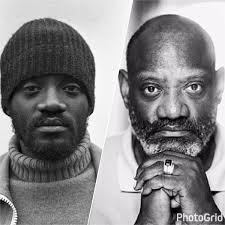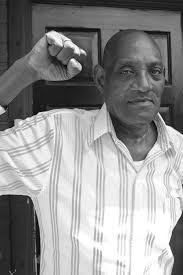|
On February 26th, 1943 a baby boy named Leighton Rhett Radford Howe was born in Moruga District, Trinidad, to parents Cipriani and Lucille Howe. Early in Howe’s academic career he attended the Queen’s Royal College (QRC) on a scholarship. Upon graduating from the QRC he traveled to London, England to study law at The Honorable Society of the Middle Temple (Middle Temple), he attended Middle Temple for two years before developing an interest in the field of journalism and returning to Trinidad in 1969. While in Trinidad Howe was heavily influenced by his uncle C. L. R. James to use journalism and political activism as a tool for liberation. C.L.R. James was an Afro-Trinidadian historian, journalist, socialist and pioneering voice in postcolonial literature. Following his passion for journalism Howe worked as the assistant editor for the Vanguard, a Trinidadian newspaper owned by the Oilfields Workers’ Trade Union. Howe learned about a US based black empowerment organization called The Black Panthers whose message was spreading to black people around the globe. In 1970, Howe moved back to London, England and became involved with the British Black Panther Movement; this is also the time he gained the nickname “Darcus”. The summer of 1970 brought about Howe, The Black Panthers and Althea Jones-Lecointe organizing with their communities to protest the British police’s constant raids of a Caribbean restaurant called the Mangrove Restaurant. The Mangrove Restaurant was owned by Frank Crichlow a black entrepreneur and activist the British police labeled as an adversary. Howe was employed at the restaurant and the establishment was used as a citadel for black organization and empowerment; the restaurant was raided at least twelve times by the police. The community protested of the constant police raids of the restaurant, one protest grew into one hundred and fifty people descending upon the police stations to protect their community members. The protest was peaceful until the people were attacked by a large number of police officers leading to many injuries and arrest of the protesters. The trial of the Mangrove Nine was a high profile landmark trial which placed black empowerment for black Britain in opposition with the local police force and the legal system. The Mangrove Nine consisted of Barbara Beese, Rupert Boyce, Frank Critchlow, Rhodan Gordon, Darcus Howe, Anthony Innis, Althea Jones-LeCointe, Rothwell Kentish and Godfrey Millett. The Mangrove Nine were arrested and charged with inciting a riot during their protest even though they were attacked by the police. Howe commanded that the Mangrove Nine be given an all-black jury for the trial but his command was denied. In 1971, the Mangrove Nine were forced to endure a trial that lasted for fifty-five days ultimately ending in all nine people being acquitted of all charges. The judge presiding over the trial acknowledging that the police officers who opposed the protesters were motivated by racial hatred was a pivotal moment within the trial. Later the judge was forced to retract his statement of motivation by racial hatred; by the time of the retraction the impact of his original statement was greatly felt. In 1973, Franco Rosso, John La Rose and Horace Ové teamed with Howe to produce the documentary film The Mangrove Nine which provides background details of the protest and trial. Later in 1973, Howe served as editor of the Race Today magazine which was established in 1969 by a black think tank called the Institute of Race Relations. Under the control of Howe the Race Today magazine was moved to Brixton in South London and became known as a black radical newspaper because it focused on the issues that were concerning black Britain. Howe recruited black activist to write for the magazine such as Farrukh Dhondy, Linton Kwesi Johnson, Barbara Beese and Leila Hassan; Hassan eventually succeed Howe as the editor of the magazine in 1988. Howe would use the magazine as an instrument to help deliver messages to the masses and to bring political and community change. They supported the Asian female worker strike, as well as, helped to organize a community squat in that resulted in the community members gaining housing and benefits. In 1977, Howe was wrongfully arrested and sentenced three months in jail for an assault charge. The charge was appealed and protest broke out to clear the name of Darcus Howe. Eventually the charge was dropped and Howe was released from jail. Howe and the Race Today magazine took on their biggest story when they became involved with the New Cross house fire. During a house party in the New Cross district of London thirteen young blacks were killed in a house fire that was believed to be started by white racist. The mainstream media used its power to convince the masses that the fire was a result of carelessness by the teens and was not racially motivated. In retaliation to the media’s side of the story Howe and others used strategies that were learned from black political heroes in the US to organize black Britain’s largest demonstration on a Monday. Over two thousand people showed up to voice their frustrations with racism and the media that supports it. After the demonstration the British police responded by using systematic racist tactics and the stop and frisk terror was intensified against black Brits. The tension between black Britain and the police led to three days of violence called the Brixton Riots. Black people in Britain took their frustrations against the police to the streets and faced their oppressors head on. Howe and the Race Today magazine was able chronicle the ordeal and tell the story from the standpoint of the oppressed people. Howe’s journalism career led him to appearing on television starting 1982 with the television series Black on Black. Howe co-edited the series with a man named Tariq Ali; both Ali and Howe would collaborate on two other television series’ Bandung File and White Tribe. In 1992, Howe hosted a television show title The Devil’s Advocate for the local channel 4 British television. He also was a writer for The New Statesman, a British political and cultural magazine. In 2005, Howe was a keynote speaker and debuted his documentary film Who You Callin’ a Nigger? at the Belfast Film Festival’s “Film and Racism” seminar. Late in 2005, Howe produced another documentary titled Son of Mine about his uneasy relationship with his son. On April 1st, 2017, Darcus Howe died of prostate cancer at the age of seventy-four. He was married three times, produced seven children and left behind a legacy of activism, organization and empowerment. Howe was a brilliant man who knew how to get his community involved in its own liberation. He understood the power of the media and why he needed to have black people documenting and telling their own stories. If it wasn’t for him and the Race Today magazine team, many more stories that impacted black Britain would have gone unknown but still negatively affected the lives of the people. Mr. Leighton Rhett Radford “Darcus” Howe, we proudly stand on your shoulders. J.A. Ward References:
https://en.wikipedia.org/wiki/Darcus_Howe https://www.theguardian.com/world/2017/apr/03/darcus-howe-obituary https://newint.org/features/web-exclusive/2013/12/30/darcus-howe-interview
0 Comments
Leave a Reply. |
Details
Categories
All
Click Here to join our mailing list
|
Contact Us: |
Connect With Us |
Site powered by PIT Web Design



 RSS Feed
RSS Feed



